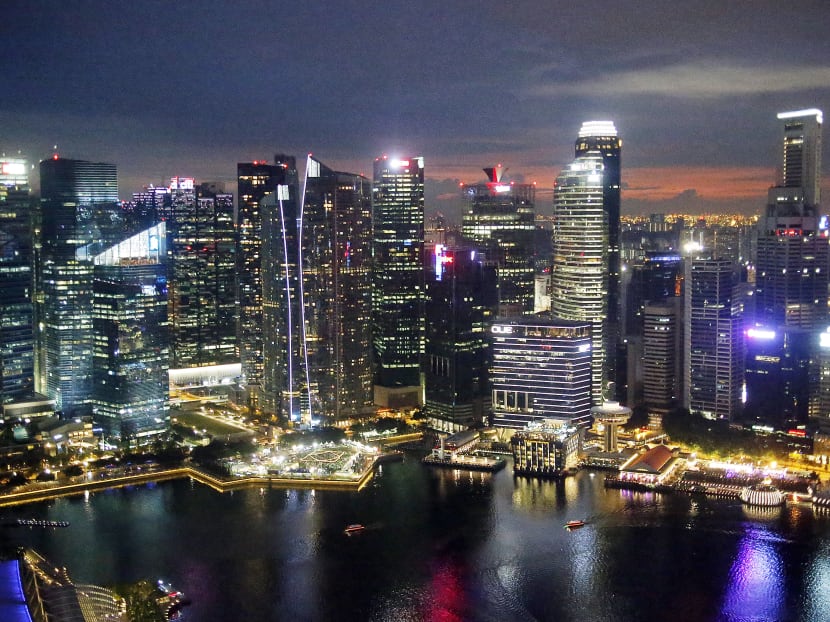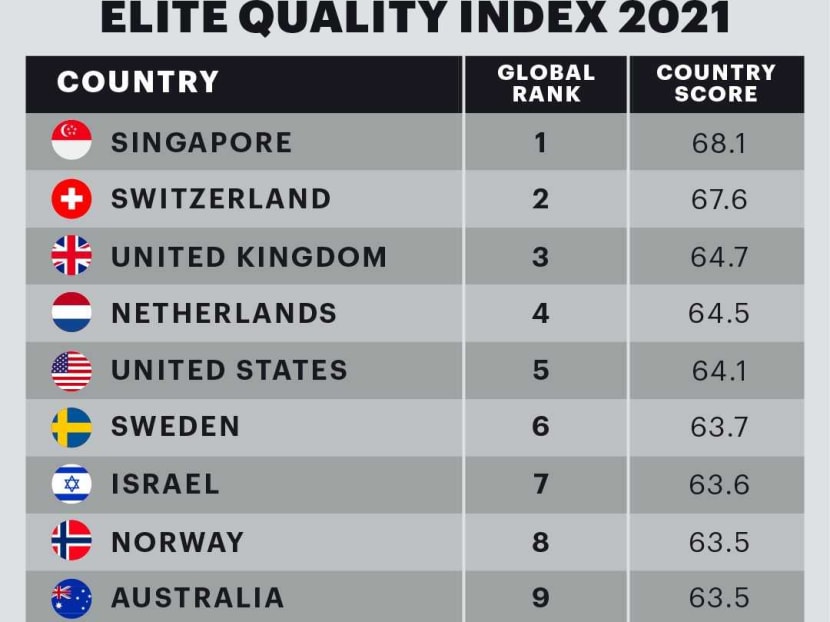Singapore tops global index on value added by 'elites' to society for second straight year
SINGAPORE — Singapore has retained the top spot for the second year running in a global index that ranks 151 countries by measuring the way in which "elites" contribute to the wealth and development of their societies.

Singapore came out in number one position in a ranking of 151 countries based on the value that elites add to their society.
- A study defined elites as “narrow, coordinated groups with business models that successfully accumulate wealth”
- The results of an index showed how elites contribute to society at large
- The findings suggested that elite value creation has been largely beneficial for society in Singapore
SINGAPORE — Singapore has retained the top spot for the second year running in a global index that ranks 151 countries by measuring the way in which "elites" contribute to the wealth and development of their societies.
The Elite Quality Index 2021, released on Monday (May 24), examined the countries across four broad areas — economic power, economic value, political power and political value.
The index, first compiled last year, is a collaboration between the Singapore Management University (SMU), the University of St Gallen in Switzerland, international academic partners and the St Gallen-based non-profit organisation Foundation for Value Creation.
The first study saw Singapore emerging top among 32 countries. This has been greatly expanded to 151 countries this year.
This year, Singapore achieved an overall score of 68.1, a slight dip from last year’s 68.5.
It ranked either first or in the top echelon of nearly half of the indicators measuring economic value.

The index also found that higher-quality elites in places such as Singapore were better able to protect their countries from the health and economic impact of the Covid-19 pandemic.
However, the results showed that Singapore was lacking in several areas such as entrepreneurial culture, which is stymied by a risk-averse society.
It scored poorly as well in some political areas such as press freedom and inclusiveness for the lesbian, gay, bisexual and transgender/transsexual people (LGBT+) community.
WHO ARE THE ELITES?
The Elite Quality Index defined elites as “narrow, coordinated groups with business models that successfully accumulate wealth”.
Sociologist Alwyn Lim from SMU, who was a research partner for the study, told TODAY this includes those in prominent business, political, and policy-making groups.
WHY SHOULD THE LAYPERSON CARE?
In recent years, the topic of how elites contribute to the wider society has been much discussed, Assistant Professor Lim said.
“The layperson should care about the results of the study because the Elite Quality Index aims to show that there are major differences in how elites, depending on their levels of political and economic influence, create value for their respective societies,” he said.
For Singapore, the results suggested that elite value creation has been largely beneficial for society.
WHAT IS THE STUDY’S INTENT?
On its website, it is stated that the study “seeks to provoke a constructive, evidence-based public discussion on elites, and how national elites contribute (or not) to society”.
Asst Prof Lim said: “We see the results of the index as useful in helping political and business leaders design more inclusive approaches to help channel the benefits of business growth to benefit the wider population.”
SOME KEY FINDINGS
Political Power — Measures three kinds of rules: Rules of the state, business regulation, and the rules of human labour
Singapore’s ranking: 22 out of 151, with a score of 66.5
Top three countries: New Zealand (score of 79.2), Finland (78.6) and the United Kingdom (77.8)
Economic Power — Measures elite dominance in the economy, at both company and industry level
Singapore ranked: 9 out of 151, with a score of 61.5
Top three countries: United Arab Emirates (score of 70.5), Estonia (69.7) and the United States (68.2)
Political Value — Measures value extraction in the political dimension; the state’s unearned income, its taking of income, and its giving of income
Singapore ranked: 6 out of 151, with a score of 66.5
Top three countries: Switzerland (score of 69.9), New Zealand (69.3) and South Korea (66.7)
Economic Value — Measures value extraction from the economy’s three markets: Products and services, the capital markets, and the labour markets
Singapore ranked: 1 out of 151, with a score of 72.7
Switzerland was second (68.7) while Qatar was third (66.7)
OTHER INDICATORS WHERE SINGAPORE RANKED TOP
- Trade freedom — A measure of the absence of tariff and non-tariff barriers that affect imports and exports of goods and services
Trade freedom encourages exports, one of the highest value creation activities in an economy, the researchers said.
- Government’s responsiveness to change — Measured through an indicator included in the World Economic Forum's Global Competitiveness Index
The researchers said that a state free from change-resistant vested interests is open to new possibilities, business models and trends.
- Property Rights — An assessment of the ability of individuals to accumulate private property, secured by clear laws that are fully enforced by the state
Property rights are a core incentive to encourage activities and behaviour that is conducive to value creation, said the researchers.
INDICATORS WHERE SINGAPORE WAS FOUND LACKING
- Entrepreneurship — The researchers said a high entrepreneurship level indicates that incumbents have low levels of economic power and cannot prevent being disrupted.
How Singapore fared: Ranked 23 out of 151, with a score of 74.8
- Press Freedom — This indicator is measured by referencing the World Press Freedom Index and reflects the degree of freedom afforded to journalists
The more press freedom within a country, the more value creation there will be in its political economy, the researchers said. It also contributes to the creation of a vibrant market for ideas, and enhances competition in the political and economic arenas, they added.
How Singapore fared: Ranked 131 out 151, with a score of 16.5
- LGBT+ Inclusiveness — This indicator is based on the Franklin & Marshall Global Barometer of Gay Rights, which classifies countries into five groups depending on the level of protection they offer in relation to LGBT+ rights
How Singapore fared: Ranked 82 out of 151, with a score of 36.4
WHAT THE INDEX SUGGESTS ABOUT SINGAPORE
In her commentary on the findings, Associate Professor Christine Dunn Henderson from SMU, who specialises in political science, said that Singapore’s market openness, combined with factors such as strong institutions and political stability, has helped the country to position itself as a regional hub for multinational corporations.
However, the findings also revealed that Singapore can improve in some areas.
“One challenge confronting Singapore’s often risk-averse society is how to foster an environment that encourages risk, creativity, and innovation — even when risk may lead to failure,” she said.
Asst Prof Lim told TODAY the findings suggested that the Singapore model is exceptional among other countries in that elites deliver more political and economic value than their influence on politics and the economy.
“This balance between influence and value creation is different for each of the countries in the index,” he said.
When asked if the poor rankings in indicators such as entrepreneurial culture, press freedom and even LGBT inclusiveness suggested that elites are not doing enough to help develop Singapore in these areas, Asst Prof Lim replied in the affirmative.
“It is more a question of government policy because of the unique Singapore context where the Government plays a significant role in coordinating the various stakeholders in Singapore society,” he said.
It is very likely that the Government plays a significant role in translating elite influence into broad-based benefits for the Singapore population, he added.











